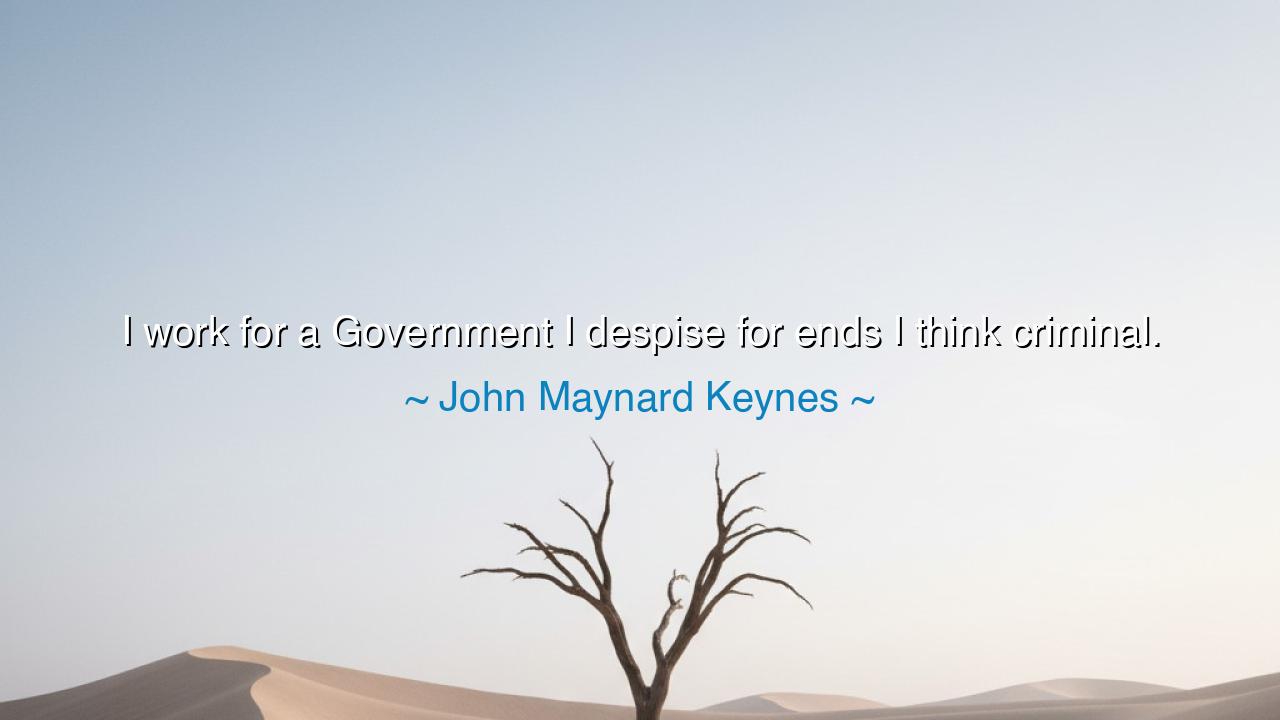
I work for a Government I despise for ends I think criminal.






"I work for a Government I despise for ends I think criminal." — John Maynard Keynes
In these haunting and confessional words, John Maynard Keynes, one of the greatest economic minds of the twentieth century, bares the anguish of a conscience torn between duty and conviction. His words burn with the weight of integrity — the cry of a man serving a government whose actions he could not condone, yet whose service he could not wholly abandon. To despise a government and yet labor for it is a condition not merely of the intellect, but of the soul — a moral torment that tests the boundary between loyalty and truth, between obedience and honor. Keynes spoke these words not in idle rebellion, but in sorrow, as one who had glimpsed the corruption of power and the fragility of righteousness in public life.
The origin of this quote reaches back to the dark days of World War I, when Keynes worked for the British Treasury. Though loyal to his country, he grew appalled at the policies pursued by the Allied leaders — policies that prolonged suffering and demanded reparations so severe that they would cripple Europe long after the war’s end. In secret letters, he lamented that the governments of men had learned nothing from tragedy; they sought not justice, but vengeance, not peace, but dominance. Thus he wrote, “I work for a government I despise for ends I think criminal,” for in his heart he knew that the pursuit of such terms would sow the seeds of future destruction. His prophecy was fulfilled when the Treaty of Versailles, with its crushing demands, gave birth to the bitterness that would one day ignite another war.
In this confession, Keynes embodies the eternal conflict between conscience and conformity. His words are not only about his government, but about every man and woman who serves under authority that betrays moral truth. There are times in every age when good people find themselves trapped within systems that do harm — when their labor sustains what their heart condemns. The soldier who fights for a cause he no longer believes in, the bureaucrat who obeys a law he knows unjust, the citizen who remains silent when his leaders do wrong — all know the pain that Keynes described. Yet to recognize such injustice is already the first act of awakening, the stirring of the moral spirit that can no longer sleep.
The story of Keynes reminds us of Socrates, who in ancient Athens chose death rather than betray his principles. When ordered to cease questioning the falsehoods of his city, Socrates refused, declaring that obedience to truth stood above obedience to men. Though Keynes did not drink poison, his resignation from the British Treasury after the war was its own quiet martyrdom — an act of courage that marked his devotion to reason over power. He left his post and wrote The Economic Consequences of the Peace, a book that laid bare the folly of the victors and the greed of governments. It was the act of a free mind defying the machinery of the state — the pen raised against the sword.
Keynes’ lament thus stands as a warning across time: that the state, however noble its origin, may become corrupted by ambition, pride, and moral blindness. When government forgets the humanity of its people, it ceases to be a servant and becomes an idol. Yet his example also reminds us that despair is not the end. Though he despised the ends of his government, he did not withdraw into silence. He used his intellect, his voice, his pen — to expose the truth, to awaken reason, and to shape a better vision for the world. This is the mark of the wise: not to abandon the struggle, but to fight it from within or without, guided by conscience.
In his later years, Keynes would return to public service, helping to rebuild the world’s economy after the Second World War — proof that even one who has walked through disillusionment may still serve with honor when the cause is just. His words thus carry both warning and hope: that while power may be corrupt, the individual spirit remains free to choose righteousness over obedience. For the virtue of a government rests not in its laws, but in the conscience of those who serve it.
So, O listener, learn from the pain and wisdom of this great thinker. There will come times when your duty to truth conflicts with your duty to authority. When that hour arrives, do not hide behind comfort or excuse. To recognize evil and remain silent is to share in it. But to speak, to act, to resist — even in small ways — is to honor the divine spark of integrity that no government can own. Remember: the voice of one honest soul can awaken the conscience of a nation.
Lesson: The truest loyalty is not to a government, but to justice and truth. When power demands the sacrifice of conscience, the noble heart must choose righteousness, even at personal cost.
Practical Action: Examine the institutions you serve — your workplace, your government, your community — and ask if their actions align with your values. Where you see wrong, speak with courage; where you see injustice, act with compassion. Do not let duty become a shield for silence. For every man and woman who dares to speak truth to power becomes a guardian of humanity’s moral soul — and ensures that even in dark times, the light of conscience shall not fade.






AAdministratorAdministrator
Welcome, honored guests. Please leave a comment, we will respond soon